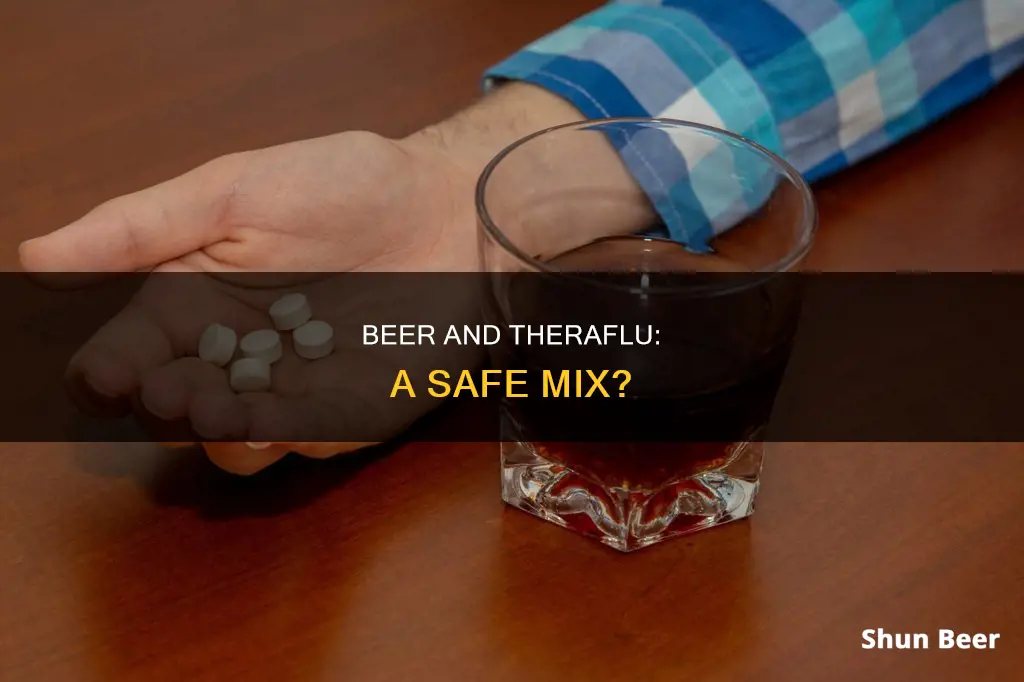
Drinking alcohol when you're feeling under the weather is generally not recommended. Alcohol can negatively impact your immune system, making it harder for your body to fight off infections and prolonging your recovery. It can also worsen symptoms such as nausea, vomiting, and headaches, and cause dehydration, which can further aggravate congestion. Additionally, alcohol can have dangerous interactions with certain over-the-counter medications, including Theraflu, which contains acetaminophen, a common pain reliever and fever reducer. Mixing alcohol with Theraflu increases the risk of liver injury due to the combination of acetaminophen and alcohol being metabolized in the liver. It is advisable to avoid alcohol when taking any medication for colds, flu, pain relief, or sleep aids, as it can increase the risk of side effects and cause serious health issues.
| Characteristics | Values |
|---|---|
| Drinking alcohol while sick | Not recommended |
| Alcohol's effect on the immune system | Weakens the body's ability to fight off infection |
| Alcohol's effect on sleep | Interrupts sleep by impairing REM sleep and activating alpha activity |
| Alcohol's effect on dehydration | Increases dehydration, which can worsen congestion |
| Alcohol's interaction with cold medication | Can be dangerous; may cause liver damage |
| Theraflu's interaction with alcohol | May increase the risk of liver injury |
What You'll Learn
- Theraflu contains acetaminophen, which can cause liver damage when mixed with alcohol
- Alcohol impairs the immune system, making it harder to recover from illness
- Alcohol can dehydrate you, exacerbating the effects of illness
- Alcohol can interact dangerously with over-the-counter cold and flu medications
- Alcohol mixed with certain medications can increase dizziness, drowsiness, and risk of respiratory depression

Theraflu contains acetaminophen, which can cause liver damage when mixed with alcohol
Theraflu is a medication used to treat cold and flu symptoms. It is important to note that Theraflu should not be consumed with alcohol, as this can lead to adverse health effects. One of the key reasons for this is that Theraflu contains acetaminophen, which can cause liver damage when mixed with alcohol.
Acetaminophen, also known as paracetamol, is a common ingredient in many over-the-counter cold and flu medications, including Theraflu. It is effective in reducing fever and relieving pain associated with these illnesses. However, when combined with alcohol, acetaminophen poses a significant risk to the liver. Both acetaminophen and alcohol are metabolized by the liver, and their concurrent consumption can lead to hepatotoxicity, or liver toxicity.
The risk of liver damage is heightened in individuals who regularly consume alcohol or have a history of alcoholism. For these individuals, the administration of acetaminophen should be limited or avoided altogether. The combination of alcohol and acetaminophen can lead to severe liver injury, and it is crucial to be aware of the signs and symptoms of liver problems. These may include upper belly pain, loss of appetite, nausea, changes in stool and urine colour, jaundice (yellowing of the skin or eyes), and unusual weakness or fatigue. If any of these symptoms are experienced, immediate medical attention is necessary.
In addition to the risk of liver damage, consuming alcohol while taking Theraflu can have other detrimental effects on the body. Alcohol can impair the immune system, making it more challenging for the body to fight off the cold or flu. It can also worsen symptoms such as nausea, vomiting, and headaches, which are common side effects of both the illness and alcohol consumption. Furthermore, alcohol can disrupt sleep patterns, impairing the body's ability to rest and recover effectively.
It is important to follow the instructions and warnings provided with Theraflu and other medications to ensure safe and effective use. Consulting with a healthcare professional or pharmacist is always recommended to clarify any concerns or questions regarding medication interactions and potential side effects.
Beer Traps: Effective Snail Control or Urban Myth?
You may want to see also

Alcohol impairs the immune system, making it harder to recover from illness
Drinking alcohol after taking Theraflu is not recommended. Theraflu contains acetaminophen, which, when combined with alcohol, can cause liver damage. Alcohol also interacts with other common cold medications, such as chlorpheniramine maleate and pseudoephedrine, which can worsen side effects like drowsiness, nausea, and headaches.
Moreover, alcohol impairs the immune system, making it harder to recover from illness. Alcohol can weaken the immune system by altering the gut microbiome and damaging epithelial cells, T cells, and neutrophils in the gastrointestinal tract. This disruption to the gut barrier function can allow bacteria to leak into the bloodstream, causing illness and triggering inflammation in the liver, which can lead to alcoholic liver disease. Alcohol also reduces the number of antibodies available to fight off infection, making it easier to get sick and prolonging the recovery process.
Alcohol also impairs immune cells in key organs, such as the lungs, where it damages the immune cells and fine hairs responsible for clearing pathogens from the airway, making it easier for viruses to gain access and causing immune cells to work less effectively. This can lead to more severe diseases and complications, such as adult respiratory distress syndrome (ARDS) and other pulmonary diseases, including pneumonia, tuberculosis, and respiratory syncytial virus.
Additionally, drinking alcohol can worsen common cold and flu symptoms, such as headaches, body aches, nausea, and fatigue. Alcohol can also cause dehydration, which can make congestion worse. Therefore, it is generally advisable to avoid drinking alcohol when sick to give your body the best chance of a speedy recovery.
The Working of Beer Cup Filling Stations Simplified
You may want to see also

Alcohol can dehydrate you, exacerbating the effects of illness
Drinking alcohol after taking Theraflu is generally not recommended. While it may be tempting to reach for an alcoholic beverage when feeling unwell, alcohol can prolong your recovery and worsen your symptoms.
One of the main reasons why alcohol is not recommended when sick is its dehydrating effects. Alcohol can cause dehydration, and being dehydrated can exacerbate congestion and other cold or flu symptoms. When you're sick, staying hydrated is crucial for a speedy recovery. However, alcohol does the opposite and depletes your body's fluid levels. This can leave you feeling even more unwell and prolong the duration of your illness.
In addition to dehydration, alcohol can also negatively impact your immune system. Alcohol is treated as a toxin by your body, which prioritizes metabolizing it over other substances. This diverts your body's resources away from fighting off the illness, slowing down your recovery. Alcohol can also disrupt your sleep, which is essential for your body to heal. While a small amount of alcohol might help you fall asleep faster, too much can interfere with the deep, restorative sleep your body needs to recover.
Furthermore, alcohol can interact dangerously with certain cold and flu medications. For example, combining alcohol with acetaminophen, a common ingredient in these medications, can lead to liver damage. Other medications, such as chlorpheniramine maleate, may cause increased drowsiness or nausea when mixed with alcohol. It's important to carefully read the labels of any medications you're taking and avoid alcohol if there is a potential for harmful interactions.
So, while it might be tempting to reach for an alcoholic drink to take the edge off your symptoms, it's best to opt for non-alcoholic, hydrating beverages when recovering from an illness.
Mixing Oxycodone and Beer: What's the Danger?
You may want to see also

Alcohol can interact dangerously with over-the-counter cold and flu medications
While it's true that there are no direct interactions between alcohol and flu medications such as Tamiflu or Xofluza, alcohol may worsen flu symptoms and medication side effects. There are several over-the-counter cold and flu medications that interact with alcohol, and these interactions can be dangerous.
How alcohol affects your body when you're sick
When you're sick, your immune system is already weakened. Drinking alcohol can further weaken your body's ability to fight off infection, prolonging your recovery. Alcohol also interrupts your sleep, which your body needs to recover from sickness. A glass of wine might help you fall asleep, but alcohol disrupts REM sleep, leaving you groggy in the morning.
Alcohol and medication
Many common cold and flu symptoms are also symptoms of a hangover. Even drinking a moderate amount of alcohol can worsen these symptoms. Alcohol can also cause dehydration, which can make congestion worse.
One of the most important things to keep in mind if you do decide to drink while you're sick is the interaction alcohol may have with any cold medications you may be taking. Alcohol can interact with some over-the-counter and prescription medications, and these combinations can be extra dangerous.
- Acetaminophen: This common pain reliever and fever reducer is found in many over-the-counter cold and flu medications. Because acetaminophen and alcohol are both metabolized in the liver, drinking while taking this medication can cause liver damage.
- Chlorpheniramine maleate: This antihistamine relieves symptoms like sneezing, a runny nose, and itchy eyes. Alcohol can worsen the side effects of this medication, such as drowsiness or nausea.
- Pseudoephedrine and phenylephrine: These common nasal decongestants will help clear your sinuses, but they can also negatively interact with alcohol, causing difficulty sleeping and headaches.
Women and elderly individuals are at a greater risk of experiencing adverse medication interactions when mixing alcohol with these medications. Women tend to have less water in their bodies than men, so the proportion of alcohol in a woman's bloodstream will be relatively higher, increasing the risk of adverse medication interactions. Elderly individuals take more time to process alcohol, so it remains in their bodies longer, increasing the chance of adverse medication interactions.
Drinking Beer and Driving in Mexico: What's Allowed?
You may want to see also

Alcohol mixed with certain medications can increase dizziness, drowsiness, and risk of respiratory depression
Drinking alcohol while taking medication can be dangerous and can lead to serious health consequences, including overdose and even death. Alcohol can interact with certain drugs and can also exacerbate the medical and mental health conditions for which you are being treated. Mixing alcohol with certain medications can increase dizziness, drowsiness, and the risk of respiratory depression.
Alcohol can make some medications less effective by interfering with how they are absorbed in the digestive tract. In some cases, alcohol increases the bioavailability of a drug, which can raise the concentration of the medication in your blood to toxic levels. Drinking alcohol can also make the side effects of a medication worse or even cause new symptoms. This is especially true if you are taking a medication that makes you sleepy or causes sedation. More intense side effects mean you might be more impaired after having just one drink than you would usually be.
Theraflu Daytime Severe Cold & Cough contains acetaminophen, dextromethorphan, and phenylephrine. Alcohol may increase the side effects of dextromethorphan, which is a CNS-active agent, and can result in additive central nervous system depression and/or impairment of judgment, thinking, and psychomotor skills. Theraflu also contains acetaminophen, which is metabolized in the liver, and drinking alcohol while taking this medication can cause liver damage.
In general, it is best to avoid drinking alcohol when taking medications. If you are unsure whether it is safe to drink alcohol while taking a particular medication, it is important to read the label carefully and consult with a doctor or pharmacist.
Beer Slug Traps: Do They Work?
You may want to see also
Frequently asked questions
No, it is not recommended to consume alcohol after taking Theraflu. Alcohol may negatively interact with the medication, leading to additive central nervous system depression and/or impaired judgment, thinking, and psychomotor skills.
Drinking alcohol while taking Theraflu increases the risk of liver injury. It can also cause dehydration, making congestion worse. Additionally, alcohol can impair your immune system, making it harder for your body to recover from the illness.
Mixing Theraflu with alcohol can worsen common cold and flu symptoms such as headaches, body aches, nausea, vomiting, and fatigue. It can also lead to respiratory depression (slowed or stopped breathing), feelings of dissociation, brain lesions, epilepsy, or permanent psychosis.
It is recommended to wait until the medication has left your body, which is usually about 24 to 48 hours after your last dose, before consuming alcohol.
Yes, natural options like menthol rub, cough drops, ivy leaf extract, or honey do not have known interactions with alcohol. However, it is still best to avoid alcohol when you are sick to give your body the best chance to recover.







